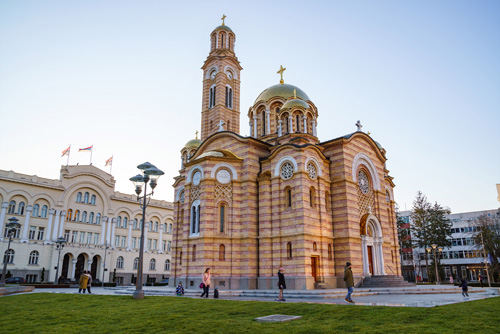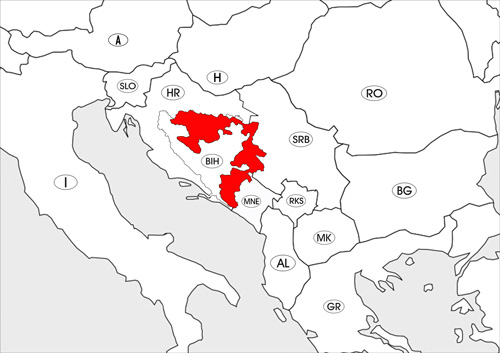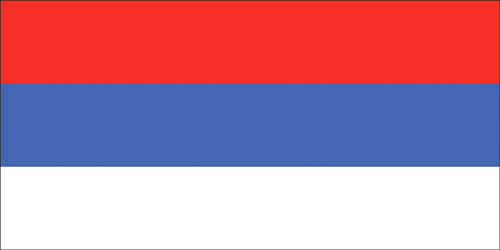
The Law on Incentives in the Economy of the Republic of Srpska ("Official Gazette of the Republic of Srpska", No. 52/19, 78/20) provides incentives for economic development, as follows:
Incentives to increase the salaries of workers employed in economic entities Companies are entitled to an incentive to increase the salary in the number of funds corresponding to the value of 70% or 30% of the paid contributions to the salary increase, depending on the initial amounts of the employee's salary.
Incentives for direct investments are intended for the realization of investment projects of economic entities, which, among other things, include the program of procurement of new technologies and modern equipment. They are realized by submitting investment projects. The subjects of direct investment projects, documents for proving the fulfillment of conditions for exercising the right to incentives, criteria for evaluation of applications and other issues of importance for the procedure of granting incentives for direct investments are defined by the Regulation on the procedure of granting incentives for direct investments. The Law on Profit Tax of the Republic of Srpska ("Official Gazette of the Republic of Srpska", No. 94/15, 1/17, 58/19) stipulates that a taxpayer who invests in equipment and facilities on the territory of the Republic of Srpska to perform a registered production activity has the right to reduce the tax base by the value of the investment made. The Law on Income Tax ("Official Gazette of the Republic of Srpska", number: 60/15, 5/16, 66/18, 105/19) contains benefits for investors. This law abolished the dividend tax and introduced significant innovations for the taxation of income from foreign sources in a positive sense. The conditions for obtaining the status of a qualified investor are defined, on the basis of which the investor acquires tax benefits for annual income (Articles 42-50).
The Employment Service of the Republic of Srpska implements projects to support employment in the economy of the Republic of Srpska, on the basis of the Rulebook on conditions, criteria and manner of implementation of active employment policy measures, and through a public call announced under this program for each year individually.
The Decision on Conditions and Procedure for Exercising the Right to Exemption from Payment of Import and Export Duties ("Official Gazette of BiH", No. 24/18) prescribes the conditions and procedure for exercising the right to exemption from payment of import duties when releasing goods in free circulation in cases prescribed by Article 207, item a) of the Law on Customs Policy in Bosnia and Herzegovina and restrictions regarding the disposal of goods that are exempt from import duties, as well as for exemptions from export duties on exports. The following shall be exempt from import and export duties:
No export duties are currently prescribed in Bosnia and Herzegovina.
The Law on Free Zones of the Republic of Srpska regulates the legal framework for the establishment and functioning of free zones in the Republic of Srpska. This Law also regulates other important issues, such as tax and customs relief, regulations governing the employment and duration of employment in the free zone, the establishment and operation of banks in the free zone and the like. The goal of passing the Law is to encourage the establishment and functioning of free zones in the Republic of Srpska and greater interest of business entities in this type of business, which would affect a larger inflow of domestic and foreign investments, contribute to job creation, enable greater investments in infrastructure and result in greater volume, jobs for subcontractors from the domestic economy and finally enabled the acquisition of new knowledge and skills of the domestic workforce.
The specificity of the Republic of Srpska and Bosnia and Herzegovina is that in the case of the establishment and regular operation of free zones, foreign trade of goods and services through them inevitably includes several levels of competent authorities and institutions, and the application of the new Law in the Republic of Srpska from 2021 at the level of BiH from 2009. This law defines the founders of business zones, users, functioning of operators, companies for business zone management, and envisages the necessary bylaws for implementation: Rulebook on criteria for assessing the economic justification of establishing a free zone (Article 14, paragraph 2) and Rulebook on content reports on the work of the free zone (Article 28, paragraph 4), and others.
The Law on Amendments to the Law on Profit Tax of the Republic of Srpska provides a taxpayer who invests in equipment and facilities for the performance of registered production activity in the territory of the Republic of Srpska with the right to reduce the tax base by the value of the investment.
Foreign investors have the same treatment as domestic persons, which is determined by the Law on Foreign Investments ("Official Gazette of the Republic of Srpska" No. 21/2018). The position of foreign investors in the Republic of Srpska is regulated and protected by the Constitution as the highest legal act, as well as by the Law on Foreign Investments of the Republic of Srpska ("Official Gazette of the Republic of Srpska" No. 21/18) and the Law on Foreign Direct Investment Policy of BiH. ("Official Gazette of Bosnia and Herzegovina" No. 17/98, 13/03, 48/10 and 22/15). The Constitution of the Republic of Srpska stipulates that the property and other rights of a foreign investor acquired on the basis of invested capital may not be limited or revoked by law or other regulation. A foreign investor is guaranteed to take out the profit and invested capital from the Republic of Srpska. When required by the general social interest, the Law may exceptionally determine in which activities or areas a foreign person cannot establish his own company. The above-mentioned Laws recognize the foreign treatment of foreign investors and they have the same rights as domestic citizens. Bosnia and Herzegovina and the Entities must not discriminate against a foreign investor on any grounds. The property of foreign investors cannot be subject to nationalization and expropriation unless a public interest is established, and then foreign investors are entitled to appropriate compensation. The rights and privileges that investors enjoy on the basis of the law cannot be revoked or annulled by the entry into force of subsequently enacted laws and bylaws. If the new laws are more favorable, foreign investors have the right to choose which law will be relevant for their investment.
Bosnia and Herzegovina and the Republic of Srpska have concluded agreements on the avoidance of double taxation with the following countries: France, Sweden, Belgium, Poland, the United Kingdom, Netherlands, Slovakia, Italy, Norway, Cyprus, Sri Lanka, Hungary, Finland, Romania, Germany, Egypt (dormant), PR China, Iran, Moldova, Croatia, Serbia, Montenegro, Pakistan, Slovenia, United Arab Emirates, Turkey, the Czech Republic, Spain, Algeria, Austria, Qatar, Kuwait, Greece, Jordan, Malaysia, Albania, Ireland, Azerbaijan, Northern Macedonia and Romania.
Bilateral agreements on trade and/or economic cooperation are concluded for the purpose of contractual regulation, and encouragement, promotion, intensification and strengthening of bilateral trade relations and economic cooperation between Bosnia and Herzegovina and other countries. Agreement signed with: Belarus, Bulgaria, the Czech Republic, Egypt, Greece, India, Indonesia, Iran, Jordan, Qatar, China, Kuwait, Hungary, Malaysia, Morocco, Pakistan, Romania, Russia, Saudi Arabia, Slovakia, Slovenia, Serbia, Switzerland, Turkey and Ukraine.
Agreements on the promotion and protection of investments are concluded in order to create favorable conditions for investment and provide legal protection and security to the investor of one contracting party and his investments in the territory of the other contracting party. These agreements define the standards of protection of foreign investments by enabling full protection and security, fair and equitable treatment, treatment of the most favored nation and national treatment of investments and income of investors of the other contracting party. Of particular importance to these agreements are the procedural mechanisms that give foreign investors the opportunity to exercise their rights independently in the event that they are violated by the behavior of the host country of the investment. Agreements have been signed with: Albania, Austria, Belgium and Luxembourg, Belarus, Montenegro, the Czech Republic, Denmark, Egypt, Finland, France, Greece, the Netherlands, Croatia, Iran, Italy, Jordan, Canada, Qatar, China, Kuwait, Lithuania, Hungary, Macedonia, Malaysia, Moldova, Germany, Pakistan, Portugal, Romania, USA, San Marino, Slovakia, Slovenia, Serbia, Spain, Sweden, Switzerland, Turkey, Ukraine and the United Kingdom.
Bosnia and Herzegovina benefits from the GSP scheme from the following countries: Australia, Eurasian Economic Union member states, Japan, New Zealand, United States.
The Constitution of the Republic of Srpska guarantees that foreign persons can acquire the right of ownership and rights on the basis of capital investment, in accordance with the law. Property and other rights of a foreign investor acquired on the basis of invested capital may not be limited or revoked by law or other regulation. In accordance with the Law on Real Rights, a foreign investor may acquire the right of ownership over real estate. Foreign legal or natural persons acquire the right of ownership over real estate in the Republic of Srpska under the conditions of reciprocity, unless otherwise regulated by law or an international agreement. A foreign legal or natural person may purchase land from: 1. Natural person or legal entity; 2. Local self-government units - through a public auction; 3. The Republic of Srpska.
A foreign person may not acquire the right of ownership in an area which, for the protection of the interests or security of the Republic of Srpska or BH, has been declared an area in which foreigners cannot acquire the right of ownership. If a foreign person had acquired the right of ownership of real estate before the area where the real estate lies was declared an area in which foreigners cannot acquire the right of ownership, the right of ownership on that real estate ceases, and the foreign person is entitled to compensation according to expropriation regulations.
Foreign citizens, whether natural or legal persons, are equal to the citizens of the Republic of Srpska in terms of the right to purchase real estate in the Republic of Srpska, only under the condition that the country they come from has reciprocity with BiH in acquiring property rights. Foreign citizens who have a legal right to purchase and acquire ownership of real estate in the Republic of Srpska expect the same procedures for the purchase of real estate and transfer of ownership, as citizens of the Republic of Srpska. These procedures include concluding a notarial contract on the sale of real estate, and registration of real estate in the Republic Administration for Geodetic and Property-Legal Affairs.

 |
|
| Official languages: | Serbian, Bosnian and Croatian |
| Capital: | Banja Luka |
| President: | Željka Cvijanović |
| Prime Minister: | Radovan Višković |
| Area: | 25.1 km² |
| Population: | 1.1 Miliona (2013) |
| Currency: | KM (BAM) |
| Calling code: | +387 |